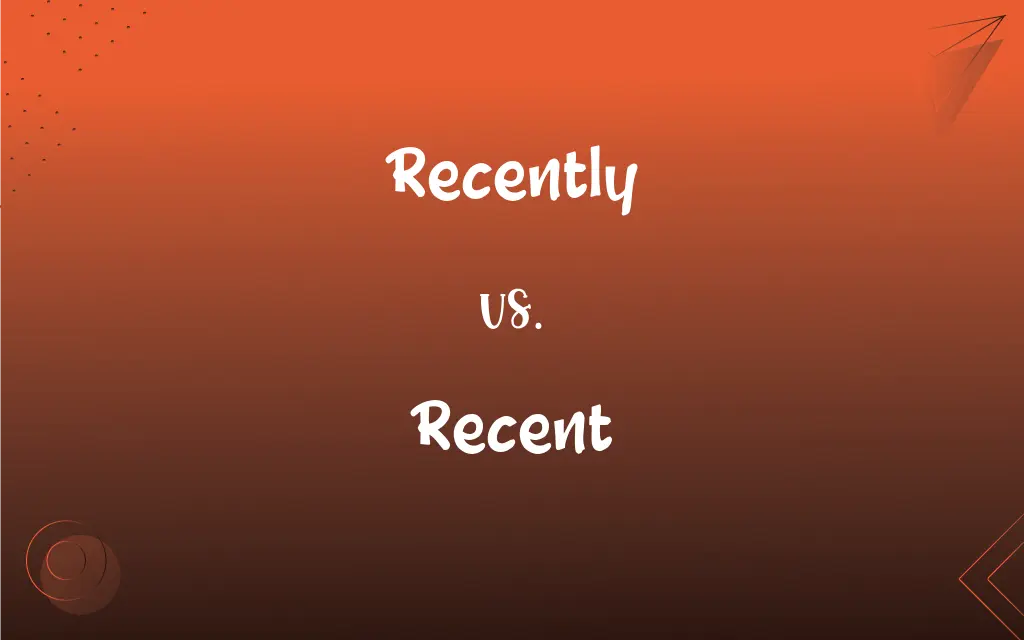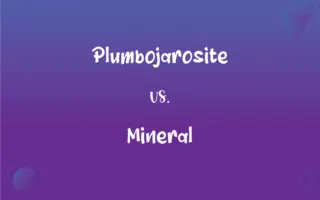Recently vs. Recent: What's the Difference?
Edited by Harlon Moss || By Janet White || Updated on September 26, 2023
Recently is an adverb describing when an action occurred, while Recent is an adjective describing the freshness or newness of a noun.

Key Differences
Recently and Recent both deal with the concept of time, but they serve distinct grammatical functions. Recently is an adverb, giving us more information about the verb in a sentence, illustrating when an action took place. On the other hand, Recent is an adjective, which describes a noun and offers a sense of nearness in time.
When one uses Recently, they're directly referring to a specific point or period in the near past. For example, if someone says they've Recently visited a place, it means the visit happened not long ago. Recent, meanwhile, could be used to describe an event, innovation, or occurrence that happened or was introduced shortly before the current time.
In the world of news and media, one might hear of Recent developments or Recent events. Here, the adjective paints a picture of something fresh or new. Conversely, when a reporter says a celebrity has Recently been spotted at an event, they're pointing to a specific occurrence in the very near past.
Recently often works in tandem with verbs. For instance, "She Recently started a new job" emphasizes the starting action. In contrast, "Her Recent job is challenging" highlights the job (a noun) with the adjective Recent.
In essence, while both Recently and Recent hint at something not being distant in the past, it's vital to remember that Recently pertains to actions, whereas Recent describes nouns.
ADVERTISEMENT
Comparison Chart
Part of Speech
Adverb
Adjective
Function
Describes when an action took place.
Describes the newness or freshness of a noun.
Usage
Used with verbs.
Used with nouns.
Example
"I Recently ate."
"I had a Recent meal."
Position
Typically placed before or after the main verb.
Usually positioned before the noun it modifies.
ADVERTISEMENT
Recently and Recent Definitions
Recently
Just a short while before.
He Recently finished his book.
Recent
Relating to a period shortly past.
He is worried about Recent developments.
Recently
Not long ago in time.
I Recently moved to New York.
Recent
Happening not long ago.
She made a Recent discovery.
Recently
Lately or in the near past.
They Recently met at a conference.
Recent
Current or up-to-date.
The Recent data suggests an improvement.
Recently
Newly or just now.
We Recently discussed that topic.
Recent
Of a time just before the present.
The Recent events have been surprising.
Recently
Of, belonging to, or occurring at a time immediately before the present.
Recent
New or fresh.
Her Recent artwork is captivating.
Recently
Modern; new.
Recent
Of, belonging to, or occurring at a time immediately before the present.
Recently
Recent(Geology) Of, relating to, or being the Holocene Epoch. See Table at geologic time.
Recent
Modern; new.
Recently
In the recent past
A recently published book
Recent
Recent(Geology) Of, relating to, or being the Holocene Epoch. See Table at geologic time.
Recently
Newly; lately; freshly; not long since; as, advices recently received.
Recent
Having happened a short while ago.
Recently
In the recent past;
He was in Paris recently
Lately the rules have been enforced
As late as yesterday she was fine
Feeling better of late
The spelling was first affected, but latterly the meaning also
Recent
Up-to-date; not old-fashioned or dated.
Recently
Very recently;
They are newly married
Newly raised objections
A newly arranged hairdo
Grass new washed by the rain
A freshly cleaned floor
We are fresh out of tomatoes
Recent
Having done something a short while ago that distinguishes them as what they are called.
The cause has several hundred recent donors.
I met three recent graduates at the conference.
Recently
In the immediate past.
She Recently celebrated her birthday.
Recent
(sciences) Particularly in geology, palaeontology, and astronomy: having occurred a relatively short time ago, but still potentially thousands or even millions of years ago.
Recent
Of the Holocene, particularly pre-21st century.
Recent
An earlier term for the Holocene.
Recent
Of late origin, existence, or occurrence; lately come; not of remote date, antiquated style, or the like; not already known, familiar, worn out, trite, etc.; fresh; novel; new; modern; as, recent news.
The ancients were of opinion, that a considerable portion of that country [Egypt] was recent, and formed out of the mud discharged into the neighboring sea by the Nile.
Recent
Of or pertaining to the present or existing epoch; as, recent shells.
Recent
Being new in a time not long past;
Recent graduates
A recent addition to the house
Recent buds on the apple trees
Recent
Of the immediate past or just previous to the present time;
A late development
Their late quarrel
His recent trip to Africa
In recent months
A recent issue of the journal
Recent
Near to or not long before the present;
Recent times
Of recent origin
FAQs
Can "Recent" be used for events that happened years ago?
Typically, "Recent" refers to a period shortly before the present. Context determines its exact timeframe.
Can I use "Recently" to describe a noun?
No, "Recently" is an adverb and is used to modify verbs, not nouns.
Are "Recent" and "Latest" synonymous?
They can be, but "Latest" often emphasizes the very newest, while "Recent" denotes near past.
How do I know when to use "Recently" or "Recent" in a sentence?
Use "Recently" with verbs and "Recent" with nouns.
Does "Recently" always need a specific time reference?
No, it can be used without specifying the exact time, as it implies the near past.
Does "Recently" always indicate a specific time frame?
It generally indicates the near past but can be subjective based on context.
How recent is "Recently"?
It's subjective and varies by context, but it generally indicates the near past.
Can "Recent" describe future events?
No, "Recent" describes events or things in the near past.
Can I say "Recent times"?
Yes, it's a common way to refer to the current era or period.
Can "Recently" be used at the start of a sentence?
Yes, for example: "Recently, we've seen a surge in demand."
Can "Recent" be used with past perfect tense?
Yes, like: "He had made a Recent decision."
Is "Recently" used only for past events?
Yes, it indicates actions or situations that occurred in the near past.
Is "Recent" only for events?
No, it can describe anything in the near past, including objects, findings, or occurrences.
Is there a noun form of "Recent"?
Yes, the noun form is "Recency."
About Author
Written by
Janet WhiteJanet White has been an esteemed writer and blogger for Difference Wiki. Holding a Master's degree in Science and Medical Journalism from the prestigious Boston University, she has consistently demonstrated her expertise and passion for her field. When she's not immersed in her work, Janet relishes her time exercising, delving into a good book, and cherishing moments with friends and family.
Edited by
Harlon MossHarlon is a seasoned quality moderator and accomplished content writer for Difference Wiki. An alumnus of the prestigious University of California, he earned his degree in Computer Science. Leveraging his academic background, Harlon brings a meticulous and informed perspective to his work, ensuring content accuracy and excellence.































































